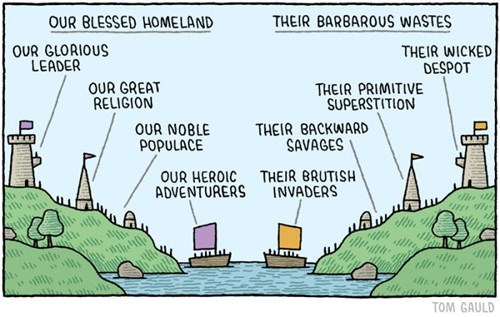The right to an abortion is fundamental to gender equality. The government should make the COVID vaccine mandatory. Socialism is the enemy. Billionaires are immoral. White privilege does not exist. Guns don’t kill people, people kill people. Immigrants take jobs. Climate change is a hoax. Masks don’t work.
When you read any of the above statements, how did you react? Did any particular statement get you more riled up than other? Did you find yourself nodding in agreement or being repelled by the pure ignorance that must have espoused such a statement?
Politicians have long known the irrationality of the average voter. We vote with our “guts” and not with our minds. As a result, politicians prey on our emotions, often focusing on the most hot-button issue that will get constituents to react as strongly as possible to support them and not the other guy/gal.

While this approach might win votes, it also creates division. As social media puts more and more people into their own isolated bubbles and echo chambers, the division has only increased. It seems we are not just operating with different points of view but are getting entirely different information to form an entirely different reality.
How are we to go about breaking through such division? How can we find common ground when it seems like “the other side” isn’t even on the same planet, let alone the same playing field? How can we connect with someone else when they seem to have totally different views on the world?
Well, if you have read anything else on my blog, you probably know my answer already: love.
In this case, however; there is a specific type of love we want to cultivate. It is a type of love that is not limited to romantic or familiar relationships but sees a fundamental connection amongst all human beings.
This type of love is known as compassion.
But First
Before we get into what compassion is and how to bring it into our lives, it is best to begin with a reflection, so when we do finally get to compassion it will make more sense.
We have to begin first with ourselves. To do that, take a few minutes to reflect. How are you feeling right now in this moment? Are you tired, excited, bored, or anxious? Are you curious where this blog post is going, or are you ready to switch over to another app?
Now ask yourself, where are you struggling in your life? Are you having challenges around work, physical or mental health, your family, a friend or your love life?
Are you suffering in any way? Do you have any achy joints or sadness concerning a loss of something important?
Do you want to be happy? Right now do you find yourself wanting more peace, calm, or joy in your life?
My final question is: do you think anybody else feels, or has felt, exactly the same way?
The Universal Human Experience
One of the most powerful exercises I like to do in workshops is what is called the “just like me mantra.”
In the exercise, participants partner up and look into each other’s eyes. I will narrate the experience with such statements as, “Just like me, this person wants to be happy. Just like me, this person does not want to be in pain. Just like me they have hopes, dreams, and aspirations, and just like me, they have had failures and setbacks.”
The experience is powerful because we often feel alone in our own experience. Our internal world of challenging thoughts and emotions can seem so far removed from the external world that also happens to contain “other” people.
As soon as we truly pay attention to the people around us, we realize that they are in their own worlds too. They have the same sad and happy moments, the same joy and the same tears, that we have.
While our external worlds are often very different, our internal worlds are the same. Every human being wants happiness. Nobody wants to be in pain.

Sure, maybe a very select incredibly small amount of people are actively trying to cause pain to others. But the vast majority of people, the red and blue, rich and poor, black and white, male and female, police, teachers, doctors and janitors, are just trying their best to maintain a sense of happiness and dignity for themselves.
We are all struggling at it, too. This is why we have the phrase “be kind, for everyone you meet is fighting a hard battle.”
The waitress that forgot an item of your order might be thinking about their sick child at home. Your boss who just berated you for missing a deadline is stressed out as a result of their failing marriage.
Compassion asks us to shift our perspective, to realize it is not me vs. you, or us vs. them, it is us vs. the problem.
Shifting Our Perspective
The late writer David Foster Wallace Talked about this phenomenon in his famous commencement speech entitled, “This is Water,” where he talks about shifting your perspective when sitting in traffic.
In this traffic, all these vehicles stopped and idling in my way, it’s not impossible that some of these people in SUV’s have been in horrible auto accidents in the past, and now find driving so terrifying that their therapist has all but ordered them to get a huge, heavy SUV so they can feel safe enough to drive. Or that the Hummer that just cut me off is maybe being driven by a father whose little child is hurt or sick in the seat next to him, and he’s trying to get this kid to the hospital, and he’s in a bigger, more legitimate hurry than I am: it is actually I who am in HIS way.
That is the mental shift that brings us back to compassion. We get out of what Krishna Das calls the Movie of Me and more into the Movie of Us. We drop out of our limited sense of self that puts ourselves at the center of our own completely right, justified world, and instead widen our circle of love to include others; even those with distinctly separate belief systems than we have.
If everyone is fighting a hard battle; if everyone is building their own sand castle that is endlessly being swept to sea, then we can look out into the world with the soft and noble heart that is compassion.
The Open Heart of Compassion
When I interviewed the self-compassion teacher Victoria Brattini on the Learn to Love Podcast, she defined compassion plainly and simply: it is the feeling that arises when we witness another person’s suffering.
What that simple definition means is that if we are to open our heart to compassion, that also means opening our heart to the suffering of others and see it as the same suffering in ourselves. With a heart full of compassion, when we see someone who is suffering, we feel their pain.
There is a lot of pain in the world, especially now in the age of the pandemic. Unfortunately, the more we close our hearts, the more we fear the experience of pain and the more it will haunt us.
If instead we open our heart and take it in; if we let it run through our veins and experience it fully, the pain will no longer own us. We will see past it and stand in awe of the resilience of people, in their ability to overcome adversity and smile despite the suffering.
All human beings experience the same emotions, pass through the same life stages and walk very similar paths through life. We all overcome incredible challenges and deal with the same fundamental fears of loss, sickness, aging, death, grief, and sorrow.
Fundamentally, we all want the same thing. This is the key to building the bridge between the divisions among us.
The Path to Happiness
Quite fantastically, this path of compassion is also the path to happiness. As Victoria mentioned in the interview, highly compassionate people tend to be more resilient, more productive, less afraid of failure (because they know it’s fundamental to the human condition), spend more time savoring the positive, and are able to express gratitude more easily.
In the Lost Art of Compassion, Lorne Ladner describes it this way,
When we approach life in a self-centered way, focusing primarily on our own protection, security, possessions, and well-being, happiness always eludes us. Seeking happiness in this way unintentionally but inevitably leads to insecurity, loneliness, neediness, and misery. By contrast, when your approach to life is based on love, empathy, and compassion for others, happiness flows to us in an ever-increasing stream.
If you want to be happy, make others happy. If you want people to love you, commit to loving others. If you want out of your own suffering, commit to alleviating the suffering of others. While our society tells us to be selfish consumers, the true path towards happiness is that of kindness and generosity.
Now more than ever, we need compassion. We need compassion for those who are sick, those who have died, and those who have lost someone who have died.
We need compassion for those in bread lines, those home alone and those unable to be with their friends and family. We need compassion for the healthcare workers working day in and day out, and compassion for everyone going to work under the most challenging of circumstances.
In this time of separation, compassion is our connection. In politics of division, compassion is our bridge. When caught up in the prison of a lonely and isolated world, compassion is the secret passageway to intimacy and joy.
Now is the time.









